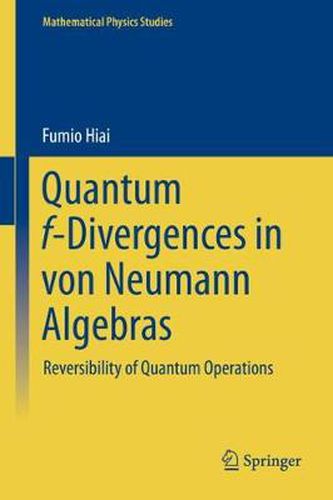Readings Newsletter
Become a Readings Member to make your shopping experience even easier.
Sign in or sign up for free!
You’re not far away from qualifying for FREE standard shipping within Australia
You’ve qualified for FREE standard shipping within Australia
The cart is loading…






This title is printed to order. This book may have been self-published. If so, we cannot guarantee the quality of the content. In the main most books will have gone through the editing process however some may not. We therefore suggest that you be aware of this before ordering this book. If in doubt check either the author or publisher’s details as we are unable to accept any returns unless they are faulty. Please contact us if you have any questions.
Relative entropy has played a significant role in various fields of mathematics and physics as the quantum version of the Kullback-Leibler divergence in classical theory. Many variations of relative entropy have been introduced so far with applications to quantum information and related subjects. Typical examples are three different classes, called the standard, the maximal, and the measured f-divergences, all of which are defined in terms of (operator) convex functions f on (0, ) and have respective mathematical and information theoretical backgrounds. The -Renyi relative entropy and its new version called the sandwiched -Renyi relative entropy have also been useful in recent developments of quantum information. In the first half of this monograph, the different types of quantum f-divergences and the Renyi-type divergences mentioned above in the general von Neumann algebra setting are presented for study. While quantum information has been developing mostly in the finite-dimensional setting, it is widely believed that von Neumann algebras provide the most suitable framework in studying quantum information and related subjects. Thus, the advance of quantum divergences in von Neumann algebras will be beneficial for further development of quantum information.
Quantum divergences are functions of two states (or more generally, two positive linear functionals) on a quantum system and measure the difference between the two states. They are often utilized to address such problems as state discrimination, error correction, and reversibility of quantum operations. In the second half of the monograph, the reversibility/sufficiency theory for quantum operations (quantum channels) between von Neumann algebras via quantum f-divergences is explained, thus extending and strengthening Petz’ previous work. For the convenience of the reader, an appendix including concise accounts of von Neumann algebras is provided.
$9.00 standard shipping within Australia
FREE standard shipping within Australia for orders over $100.00
Express & International shipping calculated at checkout
This title is printed to order. This book may have been self-published. If so, we cannot guarantee the quality of the content. In the main most books will have gone through the editing process however some may not. We therefore suggest that you be aware of this before ordering this book. If in doubt check either the author or publisher’s details as we are unable to accept any returns unless they are faulty. Please contact us if you have any questions.
Relative entropy has played a significant role in various fields of mathematics and physics as the quantum version of the Kullback-Leibler divergence in classical theory. Many variations of relative entropy have been introduced so far with applications to quantum information and related subjects. Typical examples are three different classes, called the standard, the maximal, and the measured f-divergences, all of which are defined in terms of (operator) convex functions f on (0, ) and have respective mathematical and information theoretical backgrounds. The -Renyi relative entropy and its new version called the sandwiched -Renyi relative entropy have also been useful in recent developments of quantum information. In the first half of this monograph, the different types of quantum f-divergences and the Renyi-type divergences mentioned above in the general von Neumann algebra setting are presented for study. While quantum information has been developing mostly in the finite-dimensional setting, it is widely believed that von Neumann algebras provide the most suitable framework in studying quantum information and related subjects. Thus, the advance of quantum divergences in von Neumann algebras will be beneficial for further development of quantum information.
Quantum divergences are functions of two states (or more generally, two positive linear functionals) on a quantum system and measure the difference between the two states. They are often utilized to address such problems as state discrimination, error correction, and reversibility of quantum operations. In the second half of the monograph, the reversibility/sufficiency theory for quantum operations (quantum channels) between von Neumann algebras via quantum f-divergences is explained, thus extending and strengthening Petz’ previous work. For the convenience of the reader, an appendix including concise accounts of von Neumann algebras is provided.